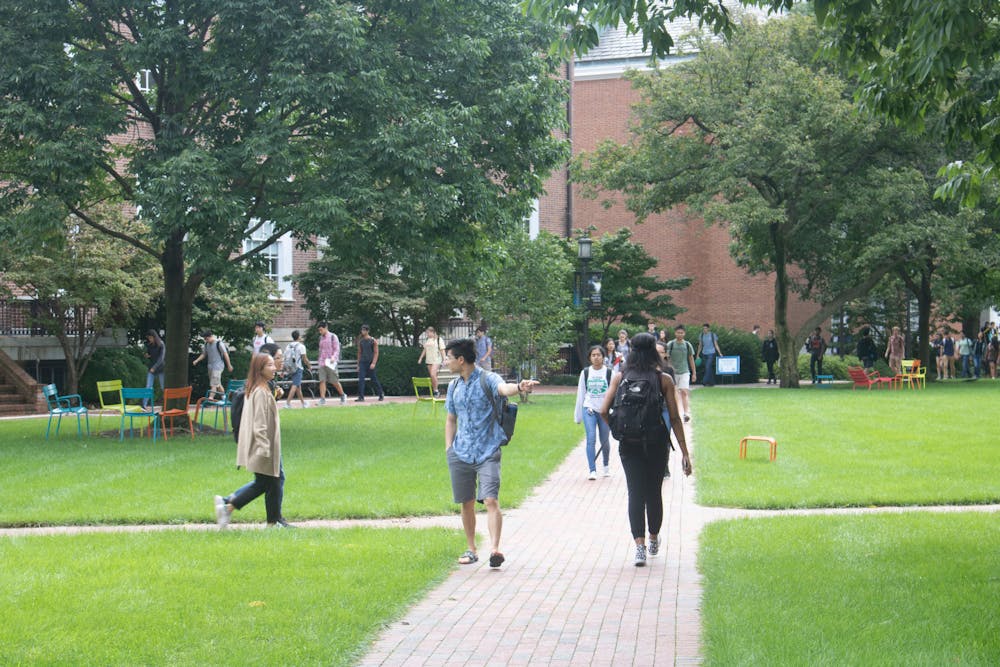In theory, college is a time and place for us to discover ourselves, establish connections and learn more about what excites us. The experience, however, comes with a steep price tag. The average cost of tuition and fees for a private college in 2021 is $38,185, nearly half of the national median family income ($79,900). This excludes the costs of room and board, dining, books and other expenses such as travel that students may incur while attending university.
A nearly imperceptible trend has developed where universities across the nation seem to be shifting from academic hubs to businesses interested in maximizing profits. These circumstances highlight the surprising nature of private universities’ finances: Private higher education often walks a fine line between acting as an educational institution and acting as a business.
In April 2020, following the onset of the COVID-19 pandemic, University President Ronald J. Daniels detailed the impact of the public health crisis on University financials, specifically its endowment. He explained that Hopkins couldn’t rely on the endowment because it was invested in financial markets hit hard by the pandemic.
Endowments are a collection of discrete funds, each with its own stipulations for how they can be used. Endowment investment yields are not taxed, and endowment spending is designed to increase the flexibility and stability of universities' futures. University endowments are invested in various ways outside of operation costs, financial aid and department programs. Endowments are usually allocated to stocks, bonds and cash investments, private equity and natural resources. In 2020, nearly 72% of college and university endowment assets were allotted to financial market investments.
The mass accumulation of funding is generally reserved to assure resources for future generations, however institutions have been criticized for “endowment hoarding” – prioritizing the health of the endowment over the health of the institution.
Often, the financial actions of private universities contradict the values they claim to represent. For example, many universities are large shareholders in the fossil fuel industry.
The mission of Hopkins is to educate its students and cultivate their capacity for lifelong learning, foster independent and original research and bring the benefits of discovery to the world. As a renowned research institution with notable environmental studies programs, the University’s investments in oil and natural gas appear to contradict the movement of the climate change crisis and diverge from its goals.
Hopkins, like other private institutions, has the opportunity to build academic strength around sustainable investments by divesting from holdings in fossil fuels. Yet the security in such financial investments outweighs the potential benefits in reevaluation and adjustment.
Universities also often invest in facilities improvements to attract more prospective students, rather than funding the development of intellectual infrastructure.
In recent years, the number of tenured faculty has decreased significantly nationwide as the number of adjunct and non-tenured faculty has risen. Universities save money and gain hiring flexibility by employing non-tenured faculty, who receive little job security and low wages. Securing tenure is considered the ultimate goal in the realm of academia; tenure ensures academic freedom, job security, health benefits and research opportunities.
The American Association of University Professors emphasizes the weakening of the system protecting academic freedom, noting that faculty cannot fulfill their responsibilities to advance and transmit knowledge if they risk their jobs due to their research or speech. Free inquiry, free expression and open dissent are critical for student learning and the advancement of knowledge.
Professors are just one crucial element in the pursuit of knowledge. The commitment to equal development in intellectual infrastructures, such as student programs and department investments, and to financial expansion bears significance on the implications of universities’ efforts to maintain ethics — implications we should all remain aware of.
Universities must ensure that their investments are equally distributed to promote the growth of university programs, improve student health, and protect against potential financial troubles. Our future ultimately rests in our own hands, and in an environment of equal opportunity, it is crucial that we maximize opportunities and resources on campus - an endeavor that Hopkins ought to support.
Ace Van Atta is a sophomore from Montclair, N.J. studying Neuroscience and Psychology. They write for the Opinions and SciTech sections of The News-Letter.





